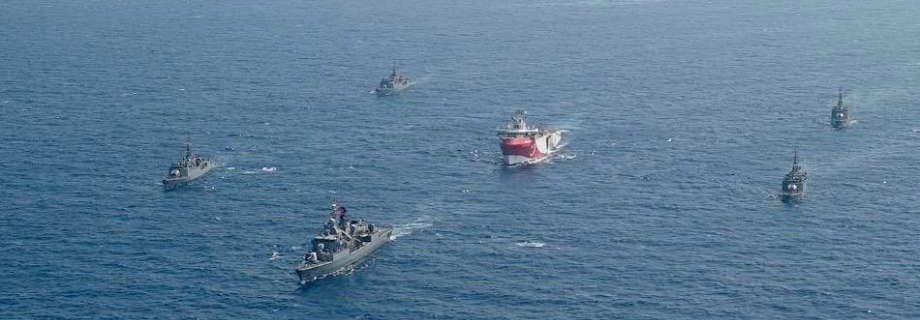A growing arms race in the Eastern Mediterranean pits several U.S. allies against each other, raising the risks of confrontation between two NATO allies.
The Turkish Ministry of Defense has tweeted pictures of the Turkish Navy escorting the research ship Oruç Reis to waters that it disputes with Greece. After a phone call with Greek Prime Minister Kyriakos Mitsotakis the following day, French Prime Minister Emanuel Macron publicly supported this posture by tweeting in Greek that he would increase France’s naval presence in the Eastern Mediterranean in response to “Turkey’s unilateral decisions in matters of oil exploration provoke tensions.”
Turkish energy exploration has become intimately linked to one of the region’s most stubborn conflicts, Libya’s civil war. Turkey supports the UN-recognized Government of National Accord (GNA) against the Libyan National Army (LNA), which is backed by Russia, France, Egypt, and the United Arab Emirates (UAE). Right now, Turkey continues to sell arms to the GNA, despite violating a UN arms embargo to do so.
In fact, Turkey has spent most of the past year moving arms to the GNA, which was struggling before the weapons arrived. Since then, the Turkish-backed forces have reversed their fortunes and taken back much of the ground that the LNA gained last year.
Unfortunately, violations of the arms embargo appear to be happening on both sides. The U.S. has accused Russia of sending weaponry and mercenaries to Libya. In June last year, the GNA discovered four Javelin anti-tank missiles after capturing a LNA base. Markings on the missiles’ shipping container suggest they were originally sold to the UAE. This year in May a confidential UN report indicated that covert UAE flights have been supplying the LNA. Transfers of American weaponry to Libyan militias would not only violate the UN embargo but also be in direct violation of U.S. arms export laws, unless given approval by the administration and notified to Congress. Further investigations into these matters are necessary.
However, Turkey’s antagonism, coupled with its success in Libya, pose a grave regional concern. Last month, Egypt’s parliament approved a military intervention in Libya. Meanwhile, Cairo and Athens announced they are pursuing their own maritime border agreement. Despite these machinations, all parties are merely playing catch-up to Turkey’s rapid expansion.
Recent developments indicate a real fear that Turkey will continue to carve up the region for itself. As of late, the Egyptian Navy has expanded its operations to include protecting newly discovered offshore natural gas. Egypt has bought four Type 209 German attack submarines, two Mistral-class Helicopter Carriers, four Gowind corvettes, and a FREMM multi-mission Frigate. Reportedly, Cairo will replace its aging Soviet MiG-21 aircraft to the newer MiG-29M and has bought forty-six Ka-52 Russian attack helicopters.
In the face of Turkey’s maneuvers, there are several steps the United States could take to support its partners against Turkish aggression.
The most direct route would be to supply Greece with improved weaponry. Athens wants to upgrade its F-16 aircraft to the new Viper version. The United States should ensure the Hellenic Air Force’s F-16 is on par with its rival, the Turkish Air Force. Providing F-35 aircraft to Greece is another option, considering Turkey’s acquisition of the advanced Russian S-400 air defense system.
The United States has taken steps to enhance its military ties to Cyprus in the past few years, but roadblocks to arms sales persist. In 2019, Congress ended a 32-year-old embargo on the sale of weapons to Cyprus, a measure of support for the Cypriots as Turkey routinely violates their sovereignty. However, no U.S. arms have yet reached Cyprus.
Congress has made clear the embargo should not lift unless Cyprus prevents “Russian military ship access to ports for refueling and servicing.” While Cypriot leaders will have to make their own decisions, closer ties to Washington rather than Moscow would seem obviously preferable, given Turkey’s increasing ties to Russia.
The United States could also help rebalance power in the region without fueling the arms race. Moving military assets from Turkey and into Greece could provide leverage to change Turkey’s behavior. The United States currently houses radar defense systems, refueling aircraft, and — reportedly — tactical nuclear weapons in Incirlik, Turkey. Erdoğan is likely to hesitate giving up hosting these weapons on its soil, especially to Greece.
Finally, the United States lacks a Special Envoy for the Eastern Mediterranean that can focus on negotiating a solution to the Libya civil war. Ending the flow of arms into Libya should be the immediate priority.
American leadership is crucial as a dangerous arms race brews in the Eastern Mediterranean. Without it, Turkey is currently the biggest winner and regional stability, the clear loser.
Ari Cicurel (@AriCicurel) is a senior policy analyst at JINSA’s Gemunder Center for Defense and Strategy.
Originally published in Breaking Defense

